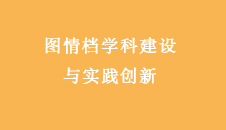SPECIAL TOPIC Ⅱ: Discipline Construction and Practice Innovation of Library, Information and Archives Management
Wei Lai
[Purpose/significance] Many normal colleges and universities in China have opened library, information and archives science. The library, information and archives science in normal colleges and universities is an important part of national library, information and archives work. Compared with the library, information and archives science in comprehensive universities, the construction of library, information and archives science in normal colleges and universities has more challenges in professional development, discipline advantages, student identity and so on. It is of great significance to study the measures and paths of library, information and archives science construction and development in normal colleges and universities. [Method/process] This paper analyzed the situation of the development of library, information and archives science in normal colleges and universities from the aspects of discipline professional certification, specialty construction and professional recognition, and took library, information and archives science of Northeast Normal University as an example, and put forward the measures and paths of library, information and archives science construction and development in normal colleges and universities, including the development and construction of major platform courses, the reconstruction of professional curriculum system, integrated practical teaching, school general education curriculum construction and promotion of teaching through competitions to enhance the value of the subject. [Result/conclusion] This paper puts forward specific suggestions of library, information and archives science construction and development in normal colleges and universities, including taking the achievement orientation as the core and student development as the basis, and constantly promoting the professional certification of library, information and archives science; building the core competence of output-oriented talent cultivation, and cultivating socially-oriented innovative and creative talents; scientific and technological development promotes field innovation, and discipline integration improves professional value.
